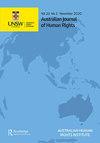The functions of modern slavery law: exploring the diverse expectations of New Zealand actors
Q1 Arts and Humanities
引用次数: 0
Abstract
ABSTRACT Building off fresh empirical research, including 15 interviews, this paper explores the diverse hopes and expectations that local actors articulated for anticipated new modern slavery legislation in New Zealand. It particularly highlights the expectations of three groups—civil society, the business sector and Government—who comprise the key actors driving the modern slavery law discussions forward. What emerges is a complex picture of competing and even conflicting expectations; sometimes made explicit, other times operating beneath the surface. The empirical evidence on the various expectations is then categorised in terms of the rich literature on the functions of law. Five core functions of modern slavery law are identified: the direct, expressive, symbolic, geopolitical and commercial functions. The paper identifies several policy implications of these diverse expectations and concludes with a call for greater clarity over what the law intends to achieve and how effectiveness should be measured.现代奴隶制法律的功能:探讨新西兰行为者的不同期望
本文以15个访谈为基础进行了新的实证研究,探讨了当地参与者对新西兰新的现代奴隶制立法所表达的不同希望和期望。报告特别强调了民间社会、商业部门和政府这三个群体的期望,他们是推动现代奴隶制法讨论向前发展的关键行动者。呈现出来的是一幅相互竞争甚至相互冲突的期望的复杂图景;有时是明确的,有时是隐藏在表面之下的。然后,根据丰富的法律功能文献,对各种期望的经验证据进行分类。现代奴隶法的五个核心功能是:直接功能、表达功能、象征功能、地缘政治功能和商业功能。这篇论文指出了这些不同期望的几个政策含义,并在结论中呼吁对法律意图实现的目标和如何衡量有效性进行更明确的说明。
本文章由计算机程序翻译,如有差异,请以英文原文为准。
求助全文
约1分钟内获得全文
求助全文
来源期刊

Australian Journal of Human Rights
Arts and Humanities-History
CiteScore
1.30
自引率
0.00%
发文量
43
期刊介绍:
The Australian Journal of Human Rights (AJHR) is Australia’s first peer reviewed journal devoted exclusively to human rights development in Australia, the Asia-Pacific region and internationally. The journal aims to raise awareness of human rights issues in Australia and the Asia-Pacific region by providing a forum for scholarship and discussion. The AJHR examines legal aspects of human rights, along with associated philosophical, historical, economic and political considerations, across a range of issues, including aboriginal ownership of land, racial discrimination and vilification, human rights in the criminal justice system, children’s rights, homelessness, immigration, asylum and detention, corporate accountability, disability standards and free speech.
 求助内容:
求助内容: 应助结果提醒方式:
应助结果提醒方式:


